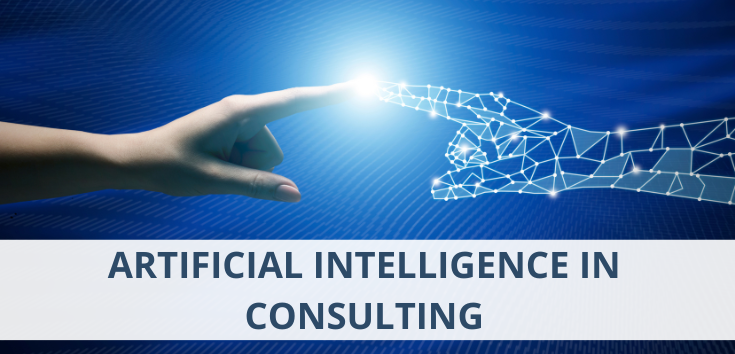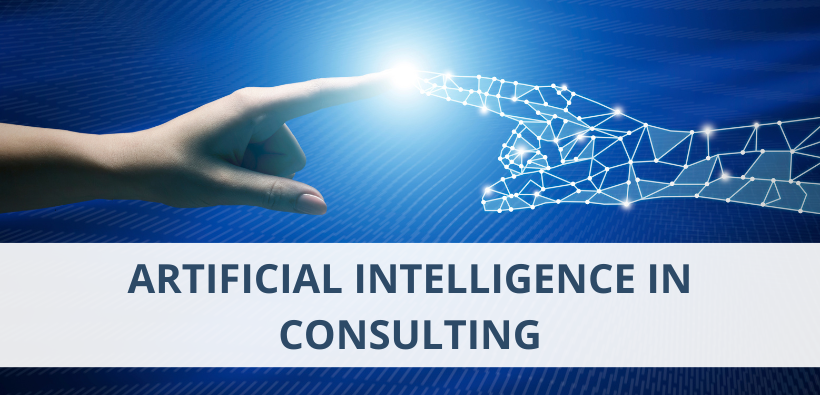The rapid development of artificial intelligence (AI) has revolutionized numerous industries in recent years, including the corporate world and consulting. AI technologies offer enormous potential to optimize business processes, support decision-making and open up new opportunities for value creation. At the same time, they present companies and consulting firms with new challenges. In this article, we highlight the advantages and disadvantages of artificial intelligence in these areas.


Artificial Intelligence In Consulting: 10 Opportunities And 10 Risks
1. 10 Opportunities of AI In The Consulting Industry
Artificial intelligence (AI) is increasingly being used in the consulting industry to optimize processes, support decision-making and offer personalized services. Here are some key areas where AI is being applied in the consulting industry:
-
Data nalysis and interpretation:
AI systems can efficiently analyze large amounts of data and recognize patterns that are difficult for human analysts to identify. This enables consultants to gain deeper insights into market trends, customer behavior and business processes. Based on this, companies and consultants can identify optimization potential and develop well-founded strategies. Even in the short term, this can lead to considerable cost and time savings. -
Automation of routine tasks:
AI can automate recurring and time-consuming tasks such as data entry, scheduling, reporting, but also mail traffic. This increases efficiency and allows advisors to focus on more complex activities. -
Personalized customer interactions:
By using AI in CRM (Customer Relationship Management) systems, consulting firms can create personalized communications and recommendations for their clients. AI algorithms can analyze customer preferences and behavior to provide tailored solutions and advisory services. This is already being used successfully in the form of SEO, for example. -
Risk management and decision support:
AI can help to identify and assess risks by analyzing market data and company information. This supports consultants in developing risk mitigation strategies and advising their clients in decision-making processes. -
Trend forecasting and scenario analysis:
AI models can simulate future market trends and business scenarios. Various global political, social or climatic scenarios can be played out, which produce different forecasts and therefore require different decisions. This helps consulting firms to support their clients in long-term planning and strategy development. -
Knowledge management and distribution:
AI can help to organize knowledge within a consulting firm and make it accessible. By using AI-powered search systems, consultants can quickly access relevant information and best practices. -
Development of AI-based products and services:
Consulting firms are increasingly developing their own AI-based tools and platforms to address specific client needs. These range from automated analysis tools to complex decision support systems. For example, McKinseyAccenture supports companies with green cloud solutions with the MyNav cloud platform. -
Training and development:
AI can also be used for internal training and the development of consultants by offering personalized learning paths and training modules. AI can also be used to generate personalized training offers in real time. -
Change in skillsets and roles:
As AI becomes more important in consulting, the skillsets and roles required will also change. There will be a higher demand for data scientists, AI experts and consultants who have in-depth knowledge of technology and data analytics. -
Competitive landscape:
The introduction of AI may change the competitive landscape in the consulting industry by reorganizing already well-established dynamics. AI may also allow smaller firms to compete with larger firms, or explore new niches for specialized AI consulting services.
2. 10 Risks of AI In The Consulting Industry
Alongside the many benefits and opportunities, the use of artificial intelligence (AI) in the consulting industry also comes with certain risks and challenges. Here are some of the most important aspects to consider:
-
Data protection and data security:
AI systems in consulting often process large amounts of sensitive data. There is a risk of data breaches, unauthorized data access or data misuse. Ensuring data security and compliance with data protection regulations such as the GDPR are therefore crucial and should be a top priority. -
High initial investment:
Implementing AI systems often requires significant investment in technology and expertise, which can be a hurdle for smaller companies. In addition, requirements may shift and there may be an increased need for training and further education in order to familiarize oneself with the new systems. -
Bias and discrimination:
AI systems can exhibit biases that are present in the training data. This can lead to discriminatory or unfair recommendations and decisions, especially in sensitive areas such as human resources or customer management. Therefore, the underlying parameters should also always be checked by humans. -
Over-reliance on technology:
Over-reliance on AI systems can lead to human expertise and critical thinking being neglected. This can be problematic as AI systems are not always able to understand the context or nuances required in complex advisory situations. -
Transparency and explainability:
Many AI models, particularly those based on deep learning, are often known as 'black boxes' as their operation and decision-making are not easily understood. This can lead to problems in building trust and acceptance among customers. -
Quality control:
The quality of the analyses and recommendations generated by AI systems depends heavily on the quality of the data and algorithms used. Inaccurate or misleading results can lead to poor decisions. For this reason, a quality analysis should be established that evaluates processes on an ongoing basis. -
Changes in the workplace:
Automation through AI may lead to a change in the work landscape in the consulting industry. Certain tasks may become obsolete, leading to challenges in retraining and adapting the workforce. This may have social and economic consequences. -
Regulatory and compliance risks:
The rapidly evolving nature of AI technology may lead to challenges in complying with existing laws and regulations. Companies must ensure that their AI applications comply with legal requirements at all times. Internationally active companies must also ensure that their AI systems also respect international law. -
Responsibility and liability:
In the event of errors or problems caused by AI systems, it can be difficult to clearly assign responsibility. This raises questions about liability and accountability. -
Complexity and maintenance:
AI systems are complex and require continuous maintenance and adaptation to remain effective. Depending on the technology chosen, this can result in high follow-up costs.
To mitigate these risks, it is important that consulting firms implement robust governance structures for the use of AI, including ethical guidelines, data protection measures, quality controls and continuous monitoring and evaluation of AI systems.
3. Conclusion
In summary, the integration of AI into the consulting industry will lead to a fundamental transformation that brings both opportunities and challenges. Artificial intelligence offers significant benefits for both companies and the consulting industry by promoting efficiency, decision-making and innovation. At the same time, challenges such as high initial investment, complexity, ethical concerns and potential job losses need to be carefully addressed. The key to success lies in a balanced strategy that leverages the benefits of AI while minimizing the risks and maintaining ethical standards. Consulting firms that utilize this technology effectively and adapt to the new realities are likely to gain a significant competitive advantage.
Continue to Learn





